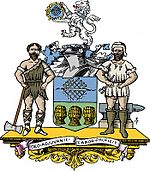User:Joshurtree/Selected article/1

Sheffield is a city and metropolitan borough in South Yorkshire, England. It is so named because of its origins in a field on the River Sheaf that runs through the city.
The city has grown from its largely industrial roots to encompass a wide economic base. The population of the City of Sheffield is estimated at 520,700 people (2005), and it is one of the eight largest English cities outside London, which form the English Core Cities Group. The wider Sheffield Urban Area, which extends beyond the city proper, has a population of 640,720.
Historically part of the West Riding of Yorkshire, Sheffield obtained world-wide recognition during the 19th century for its production of steel. Many innovations in the industry were developed locally, including crucible and stainless steel. This fuelled an almost tenfold increase in the population during the Industrial Revolution. It gained its city charter in 1893 and became officially titled the City of Sheffield. International competition caused a decline in local industry during the 1970s and 1980s, and at the same time the nearby national coal industry collapsed, affecting Sheffield's population.
In recent years, Sheffield has re-invented itself as a sporting and technology city. (read more . . . )
User:Joshurtree/Selected article/2

Sheffield Wednesday Football Club is a professional football club based in Sheffield, Yorkshire, England who currently compete in the Football League of England in The Championship division. Wednesday are one of the oldest professional clubs in the world. Their main rivals are Sheffield United, with whom they contest the Steel City derby.
The Owls have won four League titles, three FA Cups and one League Cup, but their League Cup triumph in 1991 is their only major trophy since World War II. They did reach both domestic cup finals in 1993, but lost 2–1 to Arsenal each time.
They play their home matches at Hillsborough Stadium in the north-western suburb of Owlerton, a 38,814 all-seater staduim built in 1899 when the lease expired at their previous ground at Olive Grove. The largest attendance was 72,841, which was achieved in 1934.
User:Joshurtree/Selected article/3

The Sheffield Rules was a code of football devised and played in the English city of Sheffield between 1857 and 1877. They were devised by Nathaniel Creswick and William Prest for use by the newly founded Sheffield Football Club. The rules were subsequently adopted as the official rules of Sheffield Football Association upon its creation in 1867. They spread beyond the city boundaries to other clubs and associations in the north and midlands of England making them one of the most popular forms of football during the 1860's and 70's.
Six years after the creation of the Sheffield Rules the Football Association rules were created. These were influenced by the Sheffield game but ongoing disputes meant that the Sheffield rules continued to be used. During this time many of the elements of the rules were incorporated in to the association game. Regular games were played between Sheffield and London using both sets of rules. This led to an agreement on a single set of laws administered by the Football Association in 1877.
The rules had a major influence on how the modern game of football developed. Among other things they introduced the concept of free kicks for fouls, corners and throw-ins into the laws of the game. The abolition of the fair catch also led to their teams to be the first to head the ball. Games played under the rules are also accredited for the development of heading and the origins of the goalkeeper and forward positions. The first inter-club football match and competitive tournament were both played using Sheffield Rules.
User:Joshurtree/Selected article/4
RSPB Old Moor is a 250 acre wetlands nature reserve in Barnsley, England run by the RSPB. It lies on the junction of the north/south and east/west routes of the Trans Pennine Trail. The centre was opened by Barnsley Metropolitan Borough Council in 1998 as part of the regeneration of the Dearne Valley and then developed further with the help of a lottery grant in 2002.[1] The RSPB took over management of the site in 2003 and developed the site further with funding from various sources including the Heritage Lottery Fund, Yorkshire Forward and WREN. The area around RSPB Old Moor contains several other wildlife areas including Wombwell Ings and Gypsy Marsh, (which are also managed by the RSPB), Broomhill Flash and Doveside Nature Reserve.
User:Joshurtree/Selected article/5
There are a number of defunct clubs in Sheffield that made a significant contribution to football in the city. There were 15 teams playing in Sheffield by the early 1860s but only two of them (Sheffield F.C. and Hallam F.C.) remain in existence to the present day. Until the 1877-78 season all the teams played under Sheffield Rules.
User:Joshurtree/Selected article/6
150px|right
Shaun Mark Bean (born 17 April 1959) is an English film and stage actor. Bean has also acted in a number of television productions as well as performing voice work for computer games and television adverts. As an actor, he adopted the Celtic spelling "Sean" of his first name.
Bean has played a wide range of roles, from villains to heroes. His first successful role was his portrayal of Richard Sharpe in the United Kingdom television series Sharpe.[1] Since then he has become well known internationally for his roles as Boromir in The Lord of the Rings, Martin Septim in The Elder Scrolls IV: Oblivion video game, James Bond's adversary Alec Trevelyan in GoldenEye, Nicolas Cage's competitor Ian Howe in National Treasure, IRA fringe terrorist Sean Miller out for revenge on Harrison Ford in Patriot Games, Captain Rich in Flightplan with Jodie Foster, and Odysseus in Troy.
User:Joshurtree/Selected article/7

Sheffield has a long history of involvement in sport. Although cricket was the first organised sport, it has gradually been supplanted by football. Both the main two local football teams grew out of cricket teams. Sheffield can claim many firsts in football the most famous one being Sheffield F.C. being the world's first and oldest football club. Today it has a club in every major team sport in England. Sheffield became the first UK National City of Sport in 1995[2] and is now home to the English Institute of Sport (EIS).
Today the city boasts two league clubs (Wednesday and United), top flight ice hockey (Sheffield Steelers) and basketball (Sheffield Sharks) and a Premier League speedway team (Sheffield Tigers). Sheffield Eagles is the main rugby league club and operates a level below the Super League.
The largest stadium is Hillsborough Stadium, the home of Sheffield Wednesday, which holds around 38,000. Don Valley Stadium is currently the largest athletics stadium in the United Kingdom. Bramall Lane is the world's oldest major football ground and holds around 33,000 and Sandygate Road, home to Hallam F.C., is the oldest football ground. The World Snooker Championships has been held at the Crucible Theatre since 1977.
User:Joshurtree/Selected article/8
User:Joshurtree/Selected article/8
- ^ "Sean Bean Profile". UKTV Interactive Limited. Retrieved 2006-09-14.
- ^ "Sheffield (city)". Microsoft. Retrieved 2008-01-07.